This post provides details about what kind of weather to expect in New York City throughout the year.
We include average temperatures, average precipitation, and other important information to consider.
As a retired meteorologist turned tour guide, I didn't expect that I would use my experience as a forecaster in my new career in tourism.
But here I am, finding myself answering more weather questions as a blogger than I ever did as a weatherman.
So, here are answers to some frequently asked questions about the weather in NYC in November.
- Overview
- By Month
- Coldest Month
- Wettest Month
- When Does It Snow?
- Warmest Month?
- Best Time to Visit NYC?
- What do Locals and Travelers Think?
Overview
New York has a humid continental-type climate similar to many other states in the US Northeast and is influenced by the topography and by the proximity to large water bodies.
New York City has a moderate climate overall, which makes this a great place to visit year-round.
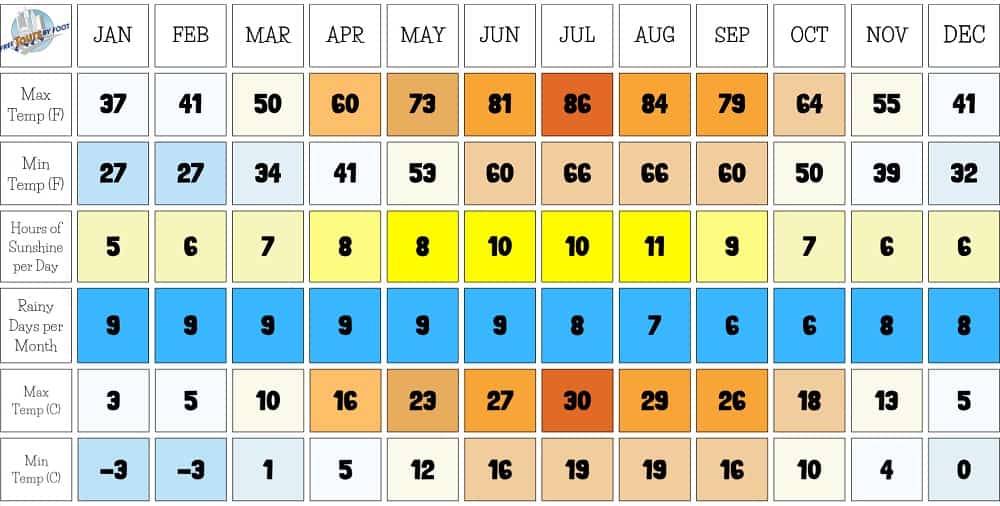
The city receives, on average, 49.9 inches (1,270 mm) of precipitation, which is relatively evenly spread out throughout the year, though the spring months are the wettest.
You can expect to see about 234 days out of the year with clear skies or at least some sunshine so come and enjoy a couple of the popular walking tours at Free Tours by Foot.
That leaves 131 days for overcast or cloudy skies or rain.
Hurricanes and tropical storms are rare in the New York area but are not unheard of.
However, the risk of a tropical cyclone affecting the city is fairly low with the highest risk being during the late summer and early fall.
NYC Weather by Month
This section covers some of the basics about what kind of weather to expect during each month of the year in New York City.
We also have full posts covering each individual month in greater detail, and we'll be sure to include links to those articles below.
Weather in January
It's mostly winter-like with daily afternoon high temperatures mostly in the upper 30's F to near 40 F (3-5 C).
However, 2-3 days will still likely produce highs reaching into the low to mid-50s F (11-12 C).
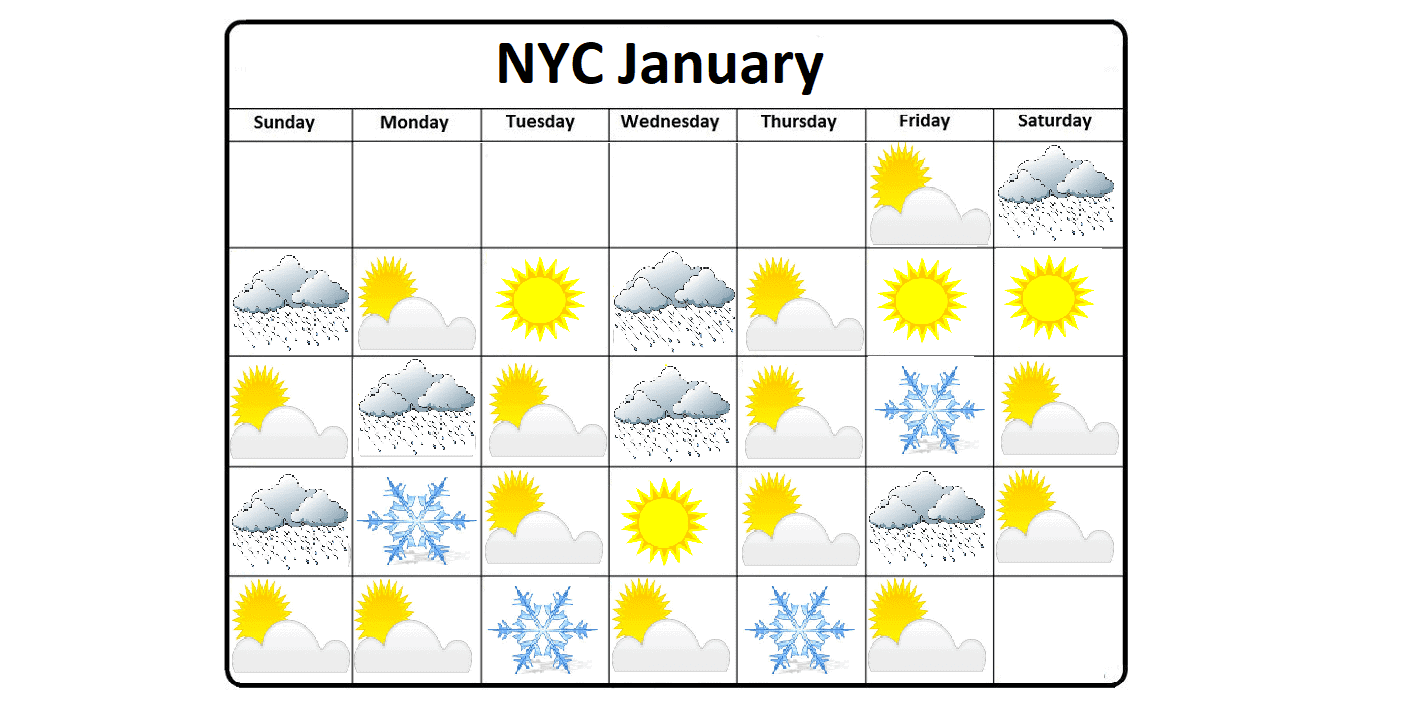
Overnight and early morning low temperatures tend to be in the mid to upper 20's F (-2 to -3 C).
However, a few of the colder mornings will likely see temperatures dipping down into the mid to lower teens (-9 to -12 C).
Learn more about the weather in NYC in January.
Weather in February
Early in February, afternoon temperatures tend to be mostly in the upper 30s f (3-4 C) while overnight and early morning lows dip into the mid to upper 20s f (-3 to -4 C).
A few of the colder mornings can see temperatures dropping into the lower teens (-10 to -12 C).
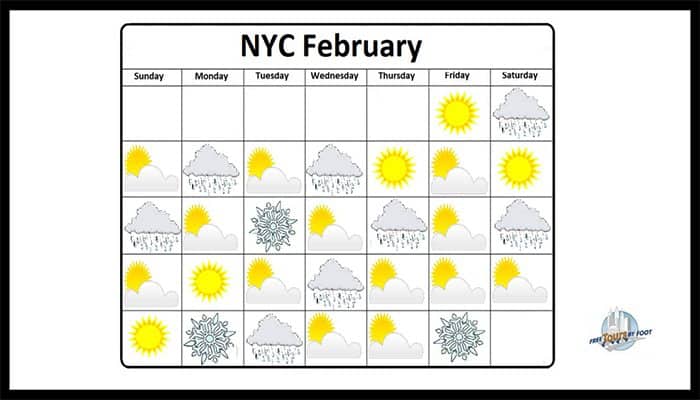
As the month progresses, daytime high temperatures begin to warm up a bit, getting up into the mid-40s F (6-7 C) with a few days reaching into the mid-50s F (12-14 C).
Skies tend to be sunny or at least partly sunny for about 17 days while some precipitation occurs, on average, on about 9-10 days.
Learn more about the weather in NYC in February.
Weather in March
Early this month, afternoon high temperatures tend to be in the mid-40s F (6-7 C) while early morning lows tend to be in the low 30s F (0 to -1 C).
On a few of the colder mornings, temperatures can still dip down into the upper teens (-7 to -8 C).
Along with late February, early March is also the windiest time of the year in NYC, with average winds of 10 mph (16 km per hour)
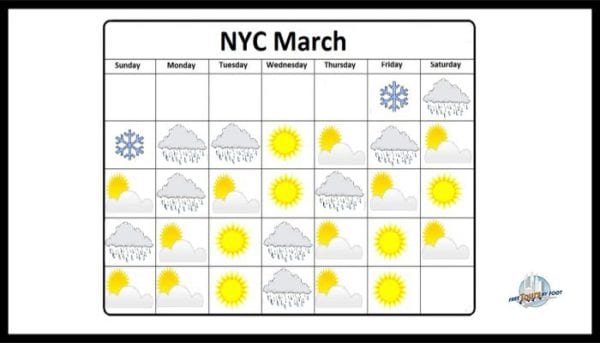
As the month progresses, spring starts to grab a hold in the Big Apple.
Afternoon temperatures rise into the low to mid-50s F (11-13 C) and morning lows creep up into the upper 30's F to near 40 F (3-5 C).
A few of the warmer afternoons can even see temperatures up into the mid-'60s (17-18 C).
Learn more about the weather in NYC in March.
Weather in April
Early in April, afternoon high temperatures tend to be in the mid-50s F (11-14 C) while the overnight lows are mostly in the upper 30s F to near 40 F (3-5 C).
Low temperatures fall to 32 F (0 C) or less, on average, only on 1 day this month.
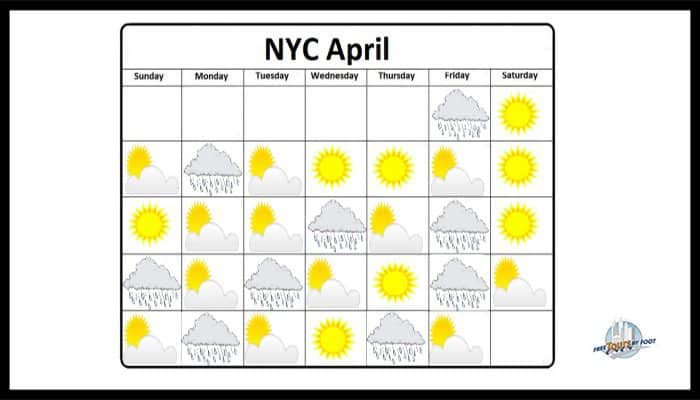
As the month draws to a close, those afternoon temperatures will rise into the low to mid-60s F (17-19 C) with the early morning lows now mostly in the mid to upper 40s F (7-10 C).
Some of the warmer afternoons will reach up into the mid-70s F (23-24 C) or higher.
Learn more about the weather in NYC in April.
Weather in May
Early May will see afternoon high temperatures mostly in the mid-60s F (17-19 C) while early morning lows will be mostly in the mid to upper 40s F (8-10 C).
A few of the colder mornings, however, can still dip into the upper 30s f to near 40f (3-5C).
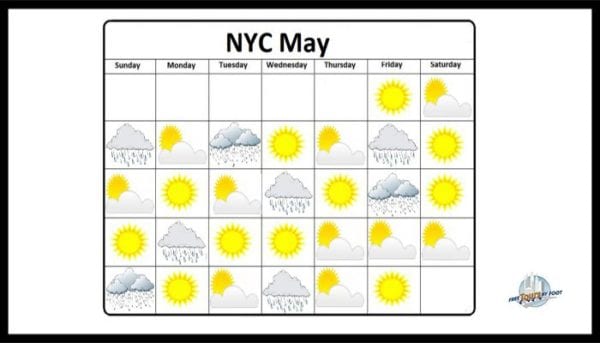
May warms quickly with those afternoon temperatures reaching into the low to mid-70s F (22-24 C) by the end of the month.
A few of the warmer days will see temperatures reaching into the mid-80s F. (28-29 C).
An afternoon high of 90 F (32 C) or higher is possible, occurring on 1 day in May in 2 out of 3 years.
Learn more about the weather in NYC in May.
Weather in June
Early in June, afternoon high temperatures are very nice, averaging mostly in the low to mid-70sF (22-24C).
Early morning lows will fall to the mid to upper 50sF (13-15C) while a couple of colder mornings can see lows down into the upper 40sF to near 50F (9-10C).
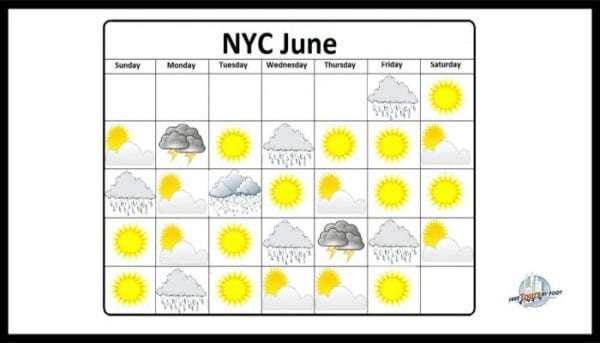
As the month progresses, temperatures warm up into the upper 70sF to lower 80sF (26-28C) while the overnight lows tend to be mostly in the mid-60sF (17-20C).
On a few of the warmer days, the high temperatures can briefly reach into the upper 80sF (30-31C) within about 2 days, on average reaching 90F (32C) or more.
Learn more about the weather in NYC in June.
Weather in July
The month of July is characterized by warm temperatures, sometimes hot and humid with daytime highs averaging in the low to mid-80s F (26-29 C).
Expect overnight lows mostly in the mid to upper-60s F (17-21 C).
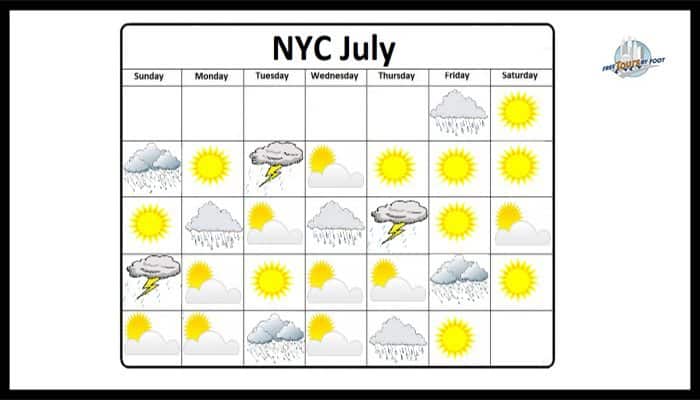
About 6-7 days this month will see afternoon high temperatures at 90 F (32 C) or higher while a few of the cooler nights can dip down into the upper 50s F (14-15 C).
In the past, July has seen extremes here as high as 106 F (41 C) and as low as 52 F (11 C).
Some rain or showers can be expected on about 10 days this month, however, only about 3 of these record significant rainfalls of 1/2 inch (13 mm) or more.
Learn more about the weather in NYC in July.
Weather in August
Early August normally sees daytime high temperatures in the low to mid 80's F (27-29 C) with about 3-5 days this month reaching or exceeding 90 F (32 C).
Overnight lows tend to be mostly in the mid to upper 60's F (19 - 21 C) during the first half of this month.
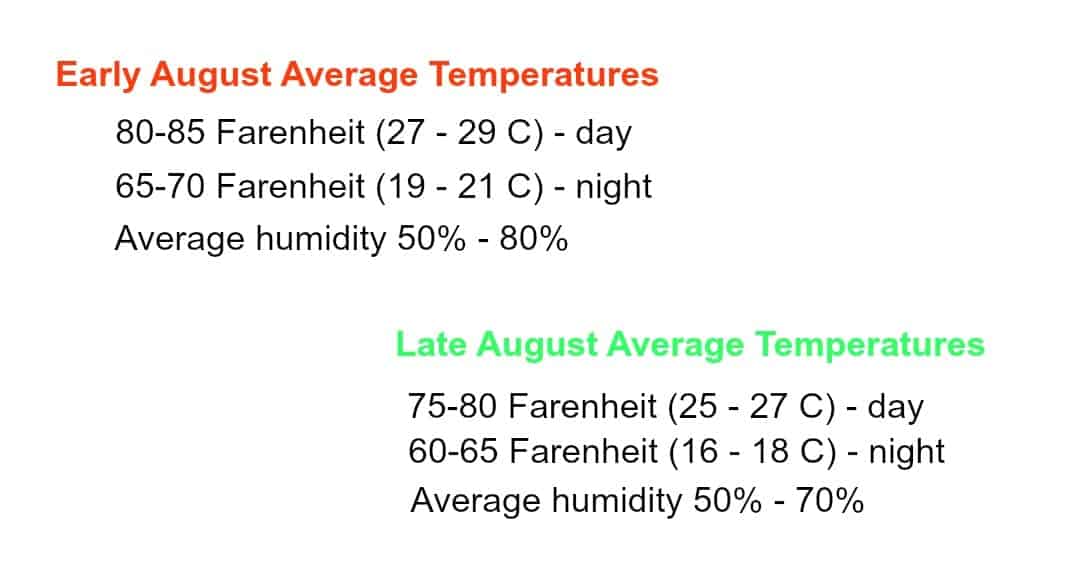
As the month draws to a close, however, the afternoon temperatures will cool slightly averaging mostly in the upper 70's F to near 80 F (25-27 C) while overnight lows now dip into the low to mid 60's F (16-19 C).
A couple of the cooler mornings could even dip into the mid to upper 50's F (13-15 C).
Past Augusts have seen temperature extremes as high as 104 f (40 c) to as low as 50 F (10 C).
Learn more about the weather in NYC in August.
Weather in September
Early September brings daytime high temperatures in the upper 70's to near 80 F (about 26 C) while near the end of the month, the daytime high temperatures are more likely to be near 70 F (21 C).
It's still recommended to have sunscreen during the day, as the sun has the potential to do damage to unprotected skin.
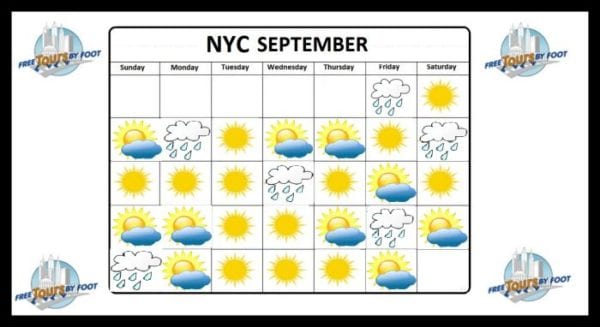
Nighttime (and early morning) low temperatures are in the mid-60s F (about 18 C) early in September falling to the mid-50s F (about 13 C) by the end of the month.
The risk for a cloudy day with some rain is about 30%, however, significant rainy days where 1/2 inch (13 mm) or more rainfalls will occur less than 10% of the time.
Learn more about the weather in NYC in September.
Weather in October
Daily temperatures range from about 55 F (13 C) in the early morning to near 70 F (21 C) during the afternoon hours early in the month, cooling to 46 F (8 C) to near 60 F (16 C) by month's end.
By October the hot days of summer are gone and it is very rare to see temperatures reaching 90 F (32 C) or falling below freezing this month.
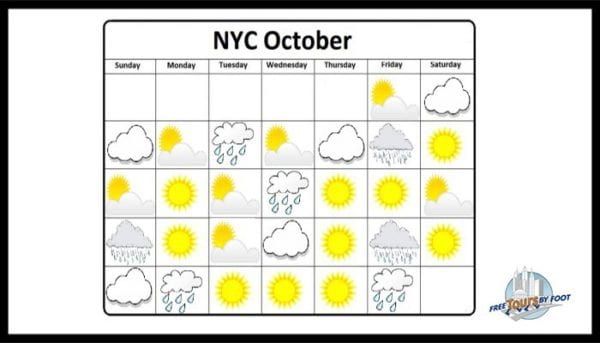
On average, 19 days this month will be either sunny or partly sunny with cloudy days and some rain likely on about 9 days.
Rainy days with 0.5 inches (13mm) of rain or more occur on 2-3 days during this month.
Snow is very rare in October, and when it does happen, it's very little and melts away. You need not worry about snow this month.
Learn more about the weather in NYC in October.
Weather in November
The weather in New York in November is noted for falling temperatures yet without the prolonged cold snaps that can occur during the winter months.
Early this month, afternoon high temperatures are still fairly mild; mostly in the upper 50s F to near 60 F (about 15 C) with overnight lows in the mid-40s F (7-8 C).
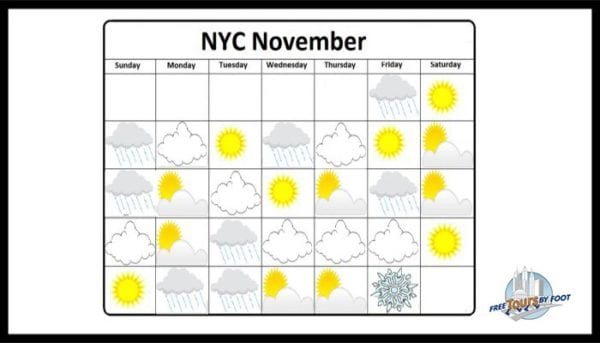
Towards the end of this month, the daytime high temperatures will have fallen into the upper 40s F to near 50 F (9-10 C) with overnight lows mostly in the mid to upper 30s F (2-3 C).
Expect 3-5 nights this month to see the temperatures dip to 32 F (0 C) or less, especially near the end of this month.
Learn more about the weather in NYC in November.
Weather in December
Early in December, the weather can sometimes still be mild with afternoon high temperatures mostly in the upper 40's F (8-9 C).
There are 2-3 days likely reaching into the upper 50's F or even to the lower 60's F (about 15-16 C).
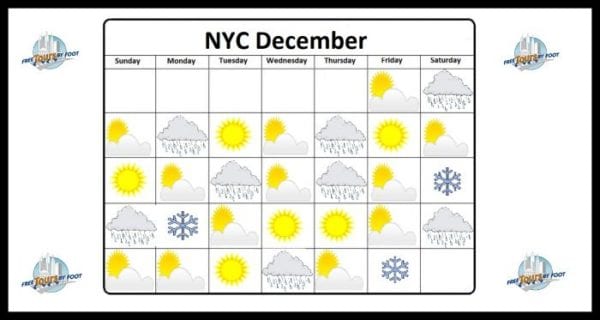
Morning lows during early December tend to be mostly in the mid to upper 30's F (2-3 C).
As the month progresses, the afternoon temperatures fall into the upper 30's F (3-4 C) while early morning lows dip into the upper 20's F (-2 to -3 C).
On a few of the colder nights and mornings, the temperature will dip down into the mid-teens (-9 to -10 C).
Learn more about the weather in NYC in December.
What is the Coldest Month in NYC?
January is the coldest month in New York City. The daily mean temperature in January is 32.6 °F (0.3 °C).
However, temperatures of 10° F (−12° C) or less can occur several times each winter while on the other hand, mild spells to 50°F (10 °C) or more occur several days each winter month as well.
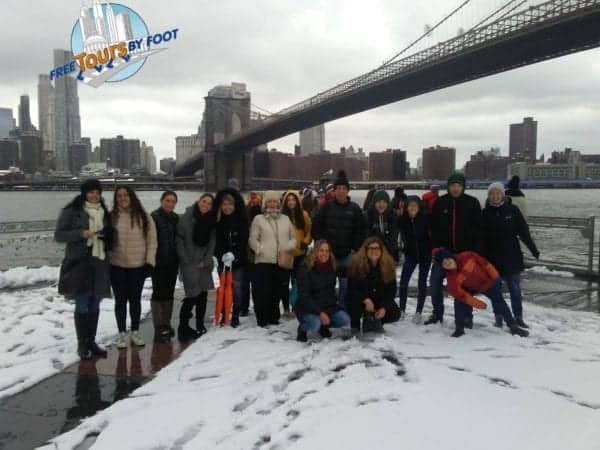
Winters tend to be cold and sometimes damp.
However, both the Atlantic Ocean and the partial shielding from the colder air by the Appalachian Mountains keep the city warmer in the winter than other inland cities nearby.
So, visiting during the winter can still be enjoyable.
Which Month Has The Most Rain?
While there isn't a major difference in rainfall from month to month, April has on average the most rainfall of any month in NYC, followed by May, June, and July.
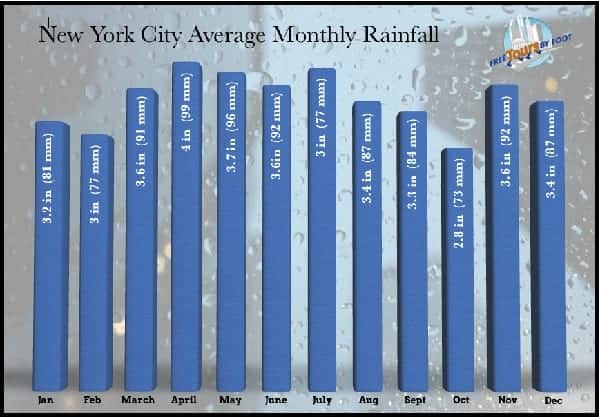
April, however, has the most days of rain, with the chance of rain being roughly 33% on any given day.
About 10 days during this month will see some rain, however, only 2 of these days usually see significant rainfalls of 0.5 inches (13mm) or more.
April and much of the spring often experience variable rain showers or steady light rain.
When Does It Snow in NYC?
February is typically the snowiest month in New York City, but it will also typically snow a few days in December and January.
Snowfall each winter averages 25.8 inches (66 cm), but this can vary considerably from year to year.
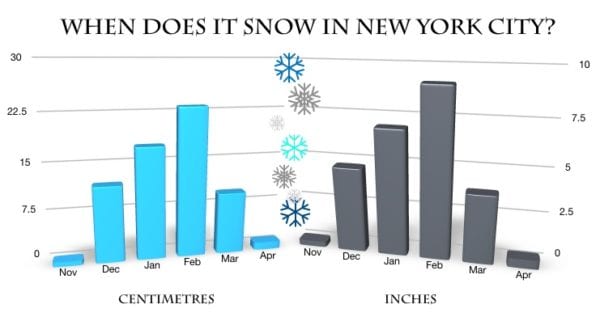
Overall, however, only about 11 days during the entire winter will see any measurable snowfall.
For more details, make sure to read our full post covering when it snows in New York City.
What is the Warmest Month in NYC?
July is usually the hottest month in New York, and visitors can expect temperatures over or around 90° F (32° C).
To give you an idea of what to expect, the hottest day in 2022 was 95° F (35° C).
The daytime high temperatures reach or exceed 90° F (32° C) on about 17 days each summer.
But, it's usually at least a little cooler the rest of the time, with average temperatures around 80° F (26° C).
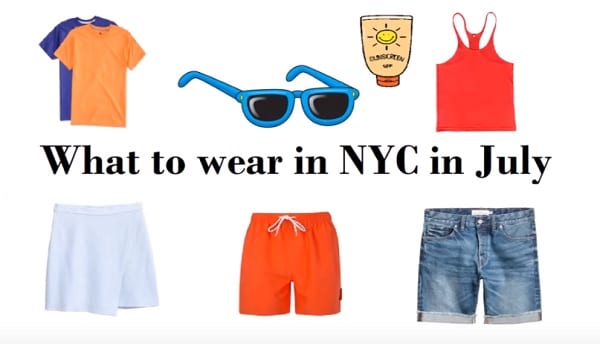
While there is still usually at least a little rain in the summer, it's not as much of a problem as it is during other months.
You'll want to bring plenty of light and comfortable clothing, but it will also make sense to bring an umbrella for the random rainstorms that might pop up.
What do Locals and Travelers Think?
We've done our best to give you an overview of what kind of weather to expect during each season in New York City, but that doesn't necessarily tell you when to visit.
While we do have an entire article focused on the best time to visit New York City, perhaps the best source for this information comes from New Yorkers themselves and travelers who have been to NYC multiple times.
We've gathered a collection of comments from our New York City Travel Tips group on Facebook to give you a better sense of when to expect good weather.


Believe it or not, this is actually a relatively common refrain on our Facebook Group. When asked, a majority of members tend to report that September and October are the best months for weather in New York.
Even those who prefer other times of the year insist this is an excellent time for weather, but there are other popular seasons.

Karen is not alone here. A lot of our group members suggest that May is an excellent time for weather in NYC, as it typically starts to get comfortably warm at that time of year and there isn't as much rain.

Finally, it's worth noting that there are plenty of people who love the weather in January and February as much, but their reasons for that are pretty obviously related to costs.
If you're interested in visiting one of the many observation decks in NYC, this is the worst time of the year for it, and the shoulder seasons (spring and fall) are much better.
For more advice about the weather, make sure to check our New York City Travel Tips Facebook Group and consider asking any question you may have as well.
Written by Fred Pickhardt
Ocean Weather Services









